Key takeaways:
- Nutrition significantly impacts mental health; incorporating omega-3s, B vitamins, and magnesium can enhance mood and energy levels.
- Mindful eating and meal planning improve mental clarity, control, and overall well-being.
- Small dietary changes, like switching to whole foods and staying hydrated, can lead to noticeable improvements in mood and mental focus.
- Foods such as dark chocolate, bananas, and nuts can act as natural mood boosters, demonstrating the link between diet and emotional health.
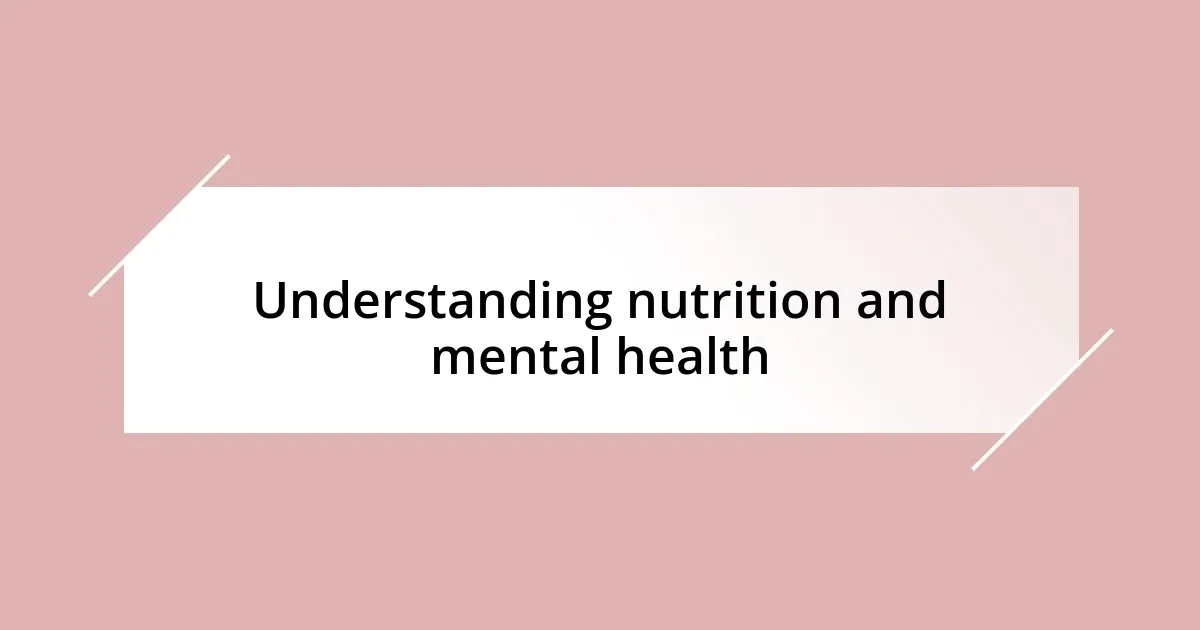
Understanding nutrition and mental health
Nutrition and mental health are intricately connected, and I’ve come to realize just how profound that connection can be. For instance, when I switched to a diet rich in omega-3 fatty acids, I noticed a remarkable shift in my mood. Have you ever experienced that feeling of clarity that comes after a nourishing meal? It’s as if the fog of anxiety simply dissipates.
It’s fascinating how certain nutrients can influence brain function. For example, B vitamins play a crucial role in the production of neurotransmitters, which are essential for mood regulation. When I focused on incorporating leafy greens and whole grains into my meals, I felt more energized and upbeat. Isn’t it interesting how what we eat can translate into how we feel?
Exploring this relationship further, I remember struggling with energy dips throughout the day. By adjusting my snack choices to include nuts and fruits instead of processed options, I felt more stable emotionally. It’s a simple change, yet the difference can be monumental. What changes have you considered in your diet that might support your mental well-being?

My personal nutrition journey
Through my nutrition journey, I’ve experienced firsthand the power of mindful eating. I remember one particular moment when I swapped my typical breakfast cereal for a smoothie packed with spinach, bananas, and almond milk. The difference in my energy levels was striking! It got me thinking—could it really be that simple? That morning, I felt a little more optimistic as if my body was thanking me for the nourishment.
As I navigated this path, I discovered the importance of meal planning, which has been a game-changer for my mental clarity. I used to rush my meals, often grabbing whatever was convenient, which left me feeling sluggish. By dedicating a bit of time each week to prep healthy options, I not only improved my diet but also my overall sense of control and well-being. It’s incredible how taking this small step transformed not just my eating habits but my mood!
Looking back, I see the evolution of my relationship with food as an essential part of caring for my mental health. Journaling about my meals has also helped me connect my food choices with my emotions. I’d jot down how I felt after a big salad versus a greasy takeaway. This practice revealed patterns I had never noticed before. Do you keep a food journal? If you haven’t tried it, I highly recommend it, as it might uncover insights about yourself too!
| Before my nutrition journey | During my nutrition journey |
|---|---|
| Rushed meals and low energy | Mindful eating and better focus |
| Emotional eating habits | Food journaling and self-discovery |
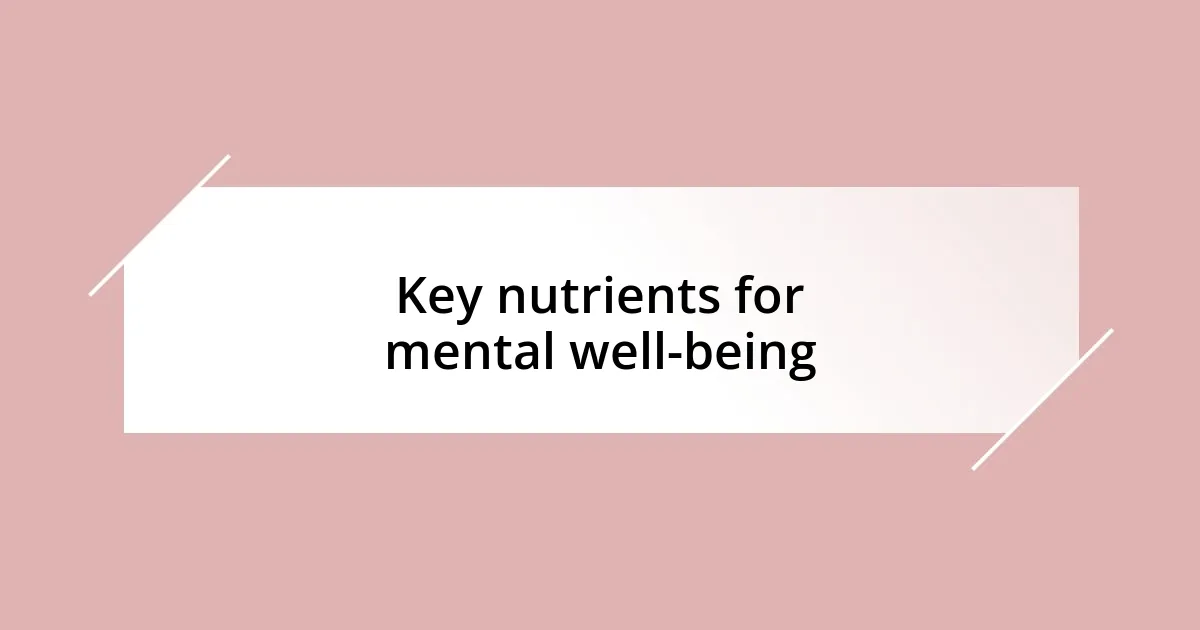
Key nutrients for mental well-being
When I think about key nutrients for mental well-being, omega-3 fatty acids always come to mind. I vividly recall a time when I incorporated more fatty fish into my meals, a switch inspired by my wish to boost my mood. The impact was almost immediate; I felt calmer and more centered, as if my mind was finally getting the fuel it craved. It’s remarkable how something as simple as a salmon dinner can transform your state of mind.
Here are some key nutrients that play vital roles in mental health:
- Omega-3 Fatty Acids: Found in fish like salmon and walnuts, they are essential for brain function.
- B Vitamins: These vitamins, especially B6, B12, and folate, support neurotransmitter production, impacting mood and energy.
- Magnesium: Found in leafy greens and nuts, magnesium can help reduce stress and anxiety.
- Zinc: This trace mineral, present in pumpkin seeds and shellfish, plays a role in regulating mood.
- Vitamin D: Often referred to as the “sunshine vitamin,” it can help with depression when levels are adequate.
One nutrient I have grown particularly fond of is magnesium. I remember spiraling into a cycle of anxiety during a particularly stressful work project, and a friend suggested adding more magnesium-rich foods to my diet. I started snacking on dark chocolate and avocados, and the soothing effect was palpable. It felt as though I was giving my body permission to find some peace amidst chaos. Nutrition can genuinely be a source of empowerment when it comes to managing our mental health, providing a foundation for resilience that I deeply appreciate.
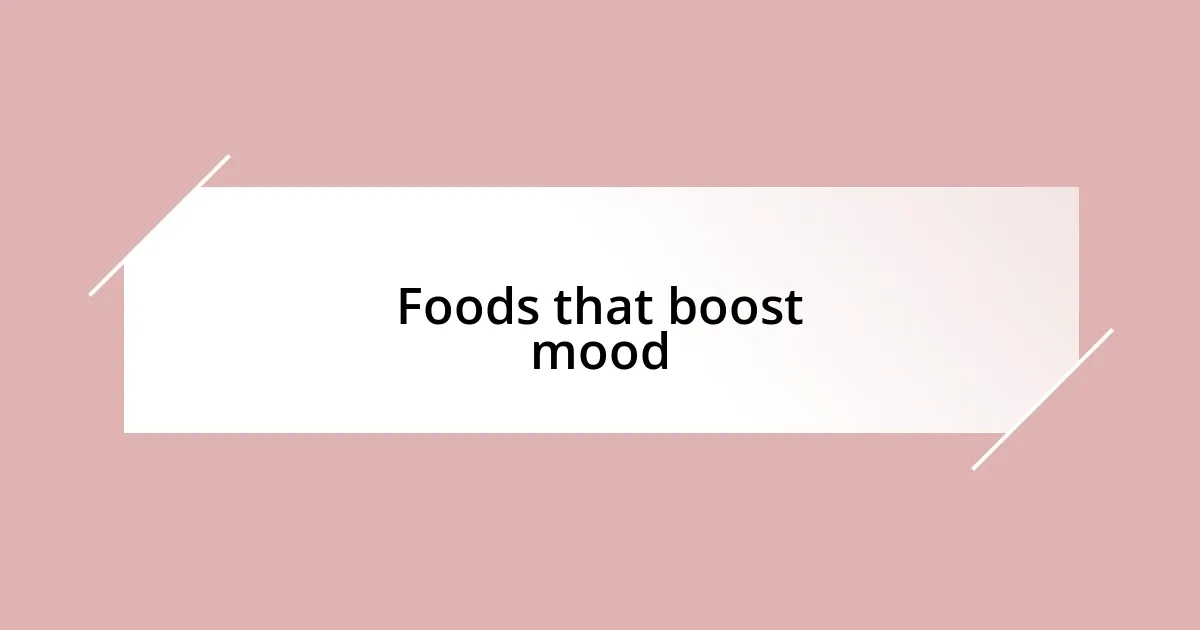
Foods that boost mood
Foods that boost mood
One of my favorite discoveries in boosting mood through food is dark chocolate. I remember a particularly gloomy afternoon when I decided to indulge in a piece after lunch. Almost instantly, it felt like a wave of comfort washed over me. The best part? The small amounts of antioxidants in dark chocolate can actually lift your spirits, making it not just a treat, but a little mood enhancer.
Then there’s the marvelous banana, which I’ve embraced as a go-to snack. The moment I feel my energy dipping, I grab one, and it never fails to bring a smile to my face. Bananas are packed with vitamin B6, which helps produce serotonin—our brain’s feel-good chemical. Have you ever experienced that happy boost from a simple piece of fruit?
I can’t talk about mood-boosting foods without mentioning nuts! Walnuts, in particular, hold a special place in my heart. They are an excellent source of omega-3 fatty acids, which I learned can significantly impact brain health. One day, while facing a busy schedule, I snacked on a handful of walnuts, and I honestly felt more focused and less anxious. Isn’t it interesting how small dietary changes can lead to such profound effects on our mood?
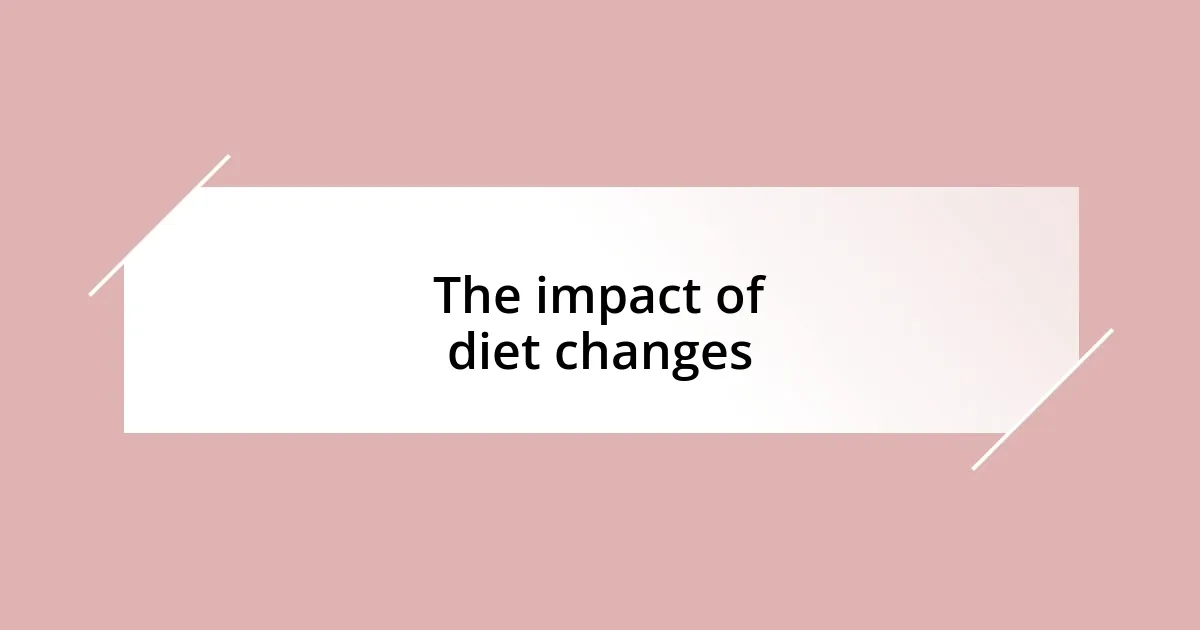
The impact of diet changes
Making changes to my diet has felt like unlocking a new level in my mental clarity. When I decided to reduce processed foods, I immediately noticed a shift in my energy levels. It was as if my mind had been staring through a foggy window, and suddenly, the glass was sparkling clean again. Isn’t it fascinating how what we consume can directly influence how we feel each day?
I once swapped out sugary snacks for fresh fruit, thinking it might be a small adjustment. To my surprise, that simple change contributed to a noticeable shift in my overall mood. Those vibrant colors on my plate—berries, oranges, and apples—didn’t just look good; they brought a sense of joy that’s hard to articulate. Have you ever felt uplifted by just the appearance of your food? It’s remarkable how our choices can impact not just our bodies but also our minds.
Going gluten-free was another significant transformation for me. I had hesitated for a while, uncertain if it would really make a difference. However, after just a few weeks, the increase in my mental clarity and reduction in brain fog were undeniable. I felt lighter, almost as if my brain had shed a layer of weight that had been holding it down. If you’ve ever felt sluggish without knowing why, exploring dietary changes might just be the key to feeling unburdened.
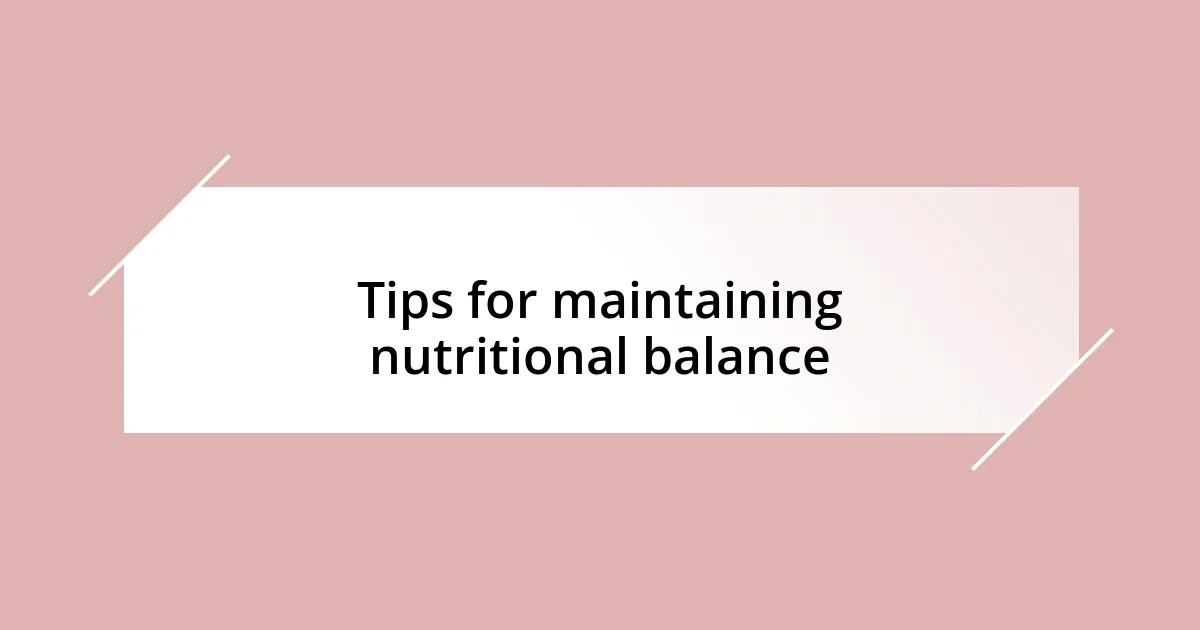
Tips for maintaining nutritional balance
Maintaining nutritional balance is key for both physical and mental well-being. One tip I can’t recommend enough is to incorporate a variety of colorful fruits and vegetables into your meals. I remember a time when I leaned heavily on beige foods—think pasta and bread—and it felt like my energy levels were stuck in a rut. Once I started mixing in vibrant foods like bell peppers and leafy greens, my plate not only looked more inviting but also made me feel alive and energized. Isn’t it amazing how a splash of color can actually brighten your day?
Prioritizing regular meal times has also transformed my relationship with food. There was a phase when I skipped meals due to a hectic schedule, and I felt the toll on both my mood and energy. Now, I set reminders on my phone to ensure I eat every few hours. I can’t stress enough how munching on small snacks—like an apple with almond butter—can keep my energy steady and my mind sharp. Have you ever noticed how consistent nourishment can alter your focus throughout the day?
Lastly, hydration often gets overlooked, but I’ve found it to be crucial in maintaining balance. I used to dismiss water intake, thinking a couple of cups was enough, but those days of feeling sluggish quickly faded once I committed to drinking more water. Carrying a reusable bottle has become a mindfulness practice for me. I think of it as giving my brain the hydration it needs to thrive. How often do you check in with your hydration? Just a few extra sips can make a world of difference!














